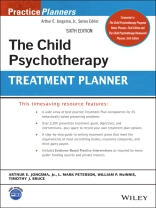Now in its sixth edition, The Child Psychotherapy Treatment Planner is an essential reference used by clinicians around the country to clarify, simplify, and accelerate the patient treatmnet planning process. The book allows practitioners to spend less time on paperwork to satisfy the increasingly stringent demands of HMOs, managed care companies, third-party payors, and state and federal agencies, and more time treating patients face-to-face.
The latest edition of this Treatment Planner offers accessible and easily navigable treatment plan components organized by behavioral problem and DSM-5 diagnosis. It also includes:
* Newly updated treatment objectives and interventions supported by the best available research
* New therapeutic games, workbooks, DVDs, toolkits, video, and audio to support treatment plans and improve patient outcomes
* Fully revised content on gender dysphoria consistent with the latest guidelines, as well as a new chapter on disruptive mood dysregulation disorder and Bullying Victim
An invaluable resource for pracaticing social workers, therapists, psychologists, and other clinicians who frequently treat children, The Child Psychotherapy Treatment Planner, Sixth Edition, is a timesaving, easy-to-use reference perfectly suited for busy practitioners who want to spend more time focused on their patients and less time manually composing the over 1000 pre-written treatment goals, objectives, and interventions contained within.
Tabla de materias
Practice Planners¯® Series Preface viii
Acknowledgments x
About the Companion Website xii
Introduction 1
Academic Underachievement 14
Adoption 25
Anger Control Problems 36
Anxiety 49
Attention-Deficit/Hyperactivity Disorder (ADHD) 62
Autism Spectrum Disorder (ASD) 74
Blended Family 86
Bullying/Aggression Perpetrator 97
Bullying/Aggression Victim 107
Conduct Disorder/Delinquency 117
Depression 130
Disruptive Mood Dysregulation Disorder (DMDD) 142
Divorce Reaction 156
Enuresis/Encopresis 168
Fire Setting 179
Gender Dysphoria 187
Grief/Loss Unresolved 197
Intellectual Disability 207
Low Self-Esteem 216
Lying/Manipulative 226
Medical Condition 237
Obsessive-Compulsive Disorder (OCD) 249
Oppositional Defiant 260
Overweight/Obesity 272
Parenting 284
Peer/Sibling Conflict 296
Physical/Emotional Abuse Victim 306
Posttraumatic Stress Disorder (PTSD) 317
Reactive Attachment/Disinhibited Social Engagement Disorder 329
School Refusal 341
Separation Anxiety 352
Sexual Abuse Victim 364
Sleep Disturbance 375
Social Anxiety 385
Specific Phobia 396
Speech/Language Disorders 406
Appendix A Bibliotherapy Suggestions 417
Appendix B Therapists’ Clinical Resources Cited in Chapters 441
Appendix C Index of Therapeutic Games, Workbooks, Toolkits, DVDs, Videotapes, and Audiotapes 473
Appendix D Recovery Model Objectives and Interventions 475
Appendix E Alphabetical Index of Sources for Assessment Instruments and Clinical Interview Forms Cited in Interventions 481
Sobre el autor
ARTHUR E. JONGSMA, Jr., Ph D, is Series Editor of the bestselling Practice Planners¯®. He has over five decades experience providing mental health services to inpatient and outpatient clients. He has authored or co-authored over fifty books.
L. MARK PETERSON, ACSW, is Program Manager for Bethany Christian Services Residential Treatment and Family Counseling programs in Grand Rapids, Michigan.
WILLIAM P. Mc INNIS, Psy D, is a private practitioner with Aspen Psychological Services in Grand Rapids, Michigan. He is co-author of the Adolescent Psychotherapy Treatment Planner.
TIMOTHY J. BRUCE, Ph D, is Professor Emeritus in the Department of Psychiatry and Behavioral Medicine at the University of Illinois College of Medicine.












